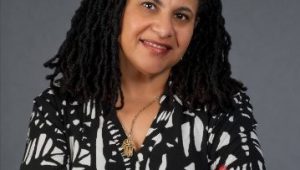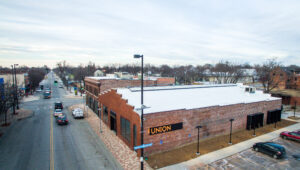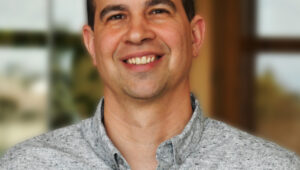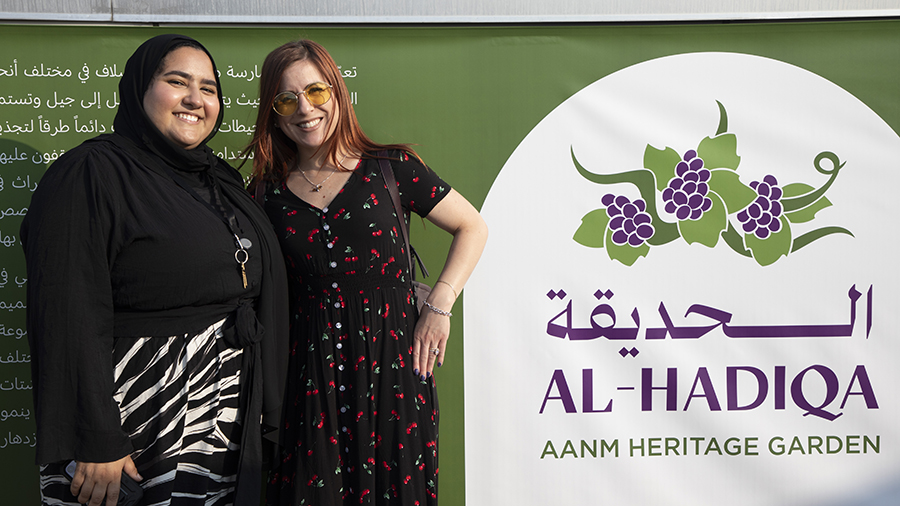
AANM’s Public Programming Coordinator, Fatima Al-Rasool, left, celebrating the opening of Al-Hadiqa. Photo by Houssam Mchaimech/Arab American National Museum.
NAS’ partnership with The Wallace Foundation‘s Advancing Well-being in the Arts Initiative has connected us to some incredible organizations working to build thriving cultural communities throughout the United States. Among these organizations is the Arab American National Museum, located in Dearborn, Michigan. We recently sat down with their Public Programming Coordinator, Fatima Al-Rasool to learn about the museum’s upcoming Al-Hadiqa Heritage Garden, which has been a true community effort from beginning to end.
First, we’d love to introduce our community to The Arab American National Museum. Can you tell us more about what the museum is and does?
The museum is the only Museum of this kind in the United States that is really devoted to the Arab American experience. Our mission is to serve as a touchstone that connects communities to Arab American culture and experiences. We’ve been open for 19 years this year and it will be our 20th anniversary next year. Since 2005 we’ve been able to document, preserve and present the history and culture of Arab Americans.
We are located in Dearborn, Michigan. We have, of course, the physical museum that has exhibitions about the Arab world and history of Arab Americans from the first immigrants all the way to today. We also have exhibit space for emerging and established artists in the Arab American world, where we uplift opportunities for artists to come to the museum being in residency with us. We also work to offer safe spaces for dialogue and community gathering. We really like to see ourselves as a place for people to come learn about what it means to be Arab American and being in community with other Arab Americans. It also provides educational opportunities for anybody and everybody. We are a Smithsonian affiliate and we’re also part of the American Alliance of Museums. We are an accredited museum and we have extensive archives.
We also do a lot of work just because we are in Dearborn, Michigan, which is the most concentrated population of Arab Americans in the nation. We are a community museum that’s very entrenched in being in Dearborn and being part of that.
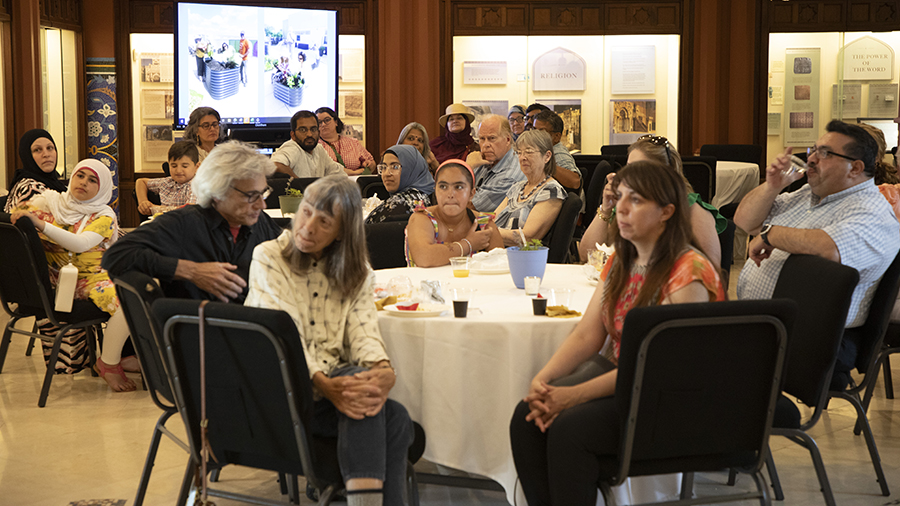
Guests attending the opening reception for Almigdad Aldikhaiiry’s solo exhibition, Existence. Photo by Houssam Mchaimech/Arab American National Museum.
We were told you were interested in talking with us about the Al-Hadiqa Heritage Garden. Can you tell us about it and why it’s feeling important to you and the communities AANM serves?
We have our opening celebration, which will be on June 8th. The garden was a project that we started about two years ago. My coworker and I were talking about the rooftop – that we had a rooftop terrace that was really just kind of barren. It was such a good, nice space and it wasn’t really being utilized. We had this idea of starting a vegetable garden, but then, we thought about it more and it was like, why can’t this just be a space for all the communities to come and gather.
Gardening is an important ancestral practice throughout the Arab world. There’s such a love and appreciation for gardening. In Eastern Michigan, where the museum is located, we saw that Arab Americans were bringing seeds and plants that really reminded them of their heritage and planting them here in America, where they can go out to the garden and celebrate where they come from, their ancestry, and the practices that have been passed down generation to generation. This felt like an important story and one that’s relatable to everybody. Even if you’re not Arab, you have a gardener somewhere in your family who you think about and you remember fondly, or some kind of plant that makes you think of home, or some kind of scent of flowers that gives you memory.
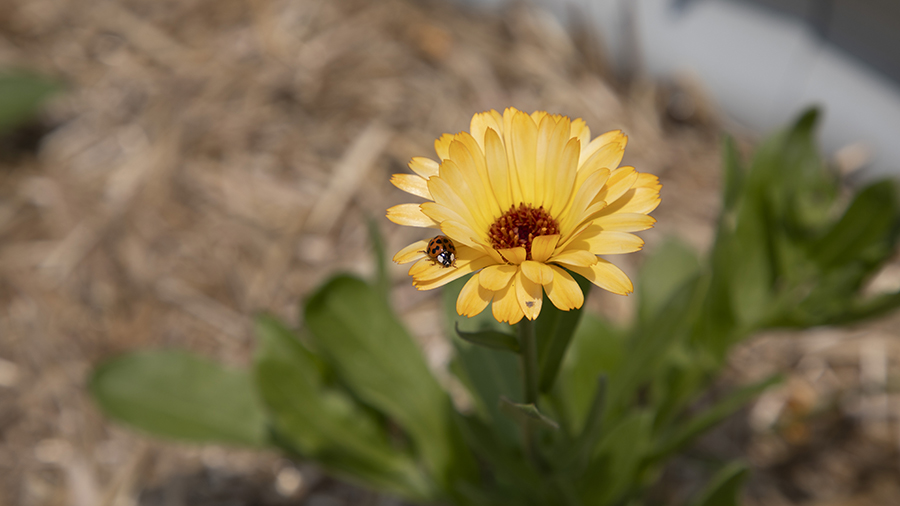
One of the many pollinators attracted to the rooftop garden. Photo by Houssam Mchaimech/Arab American National Museum.
It’s a very cross departmental project. We worked with our oral historian to gather stories and seeds which were also needed by local community members. People would give us plants that either they brought from the Arab world, or native pollinator plants that remind them of home. They donated seeds along with their stories.
It’s such a nice space, even as a person that works here, just to be able to go outside and be with all the flowers and vegetables. And we have pollinators coming! Our most exciting moment last year was when we saw our first bumblebee, and now we have butterflies too.
We worked with a local consultant named Guardian Juju Collective and they’re very knowledgeable about plants of all types. Combining seeds from the Arab world with native pollinator plants makes this a powerful representation of who the Arab diaspora is in Dearborn. It’s uniquely Arab and uniquely American at same time.
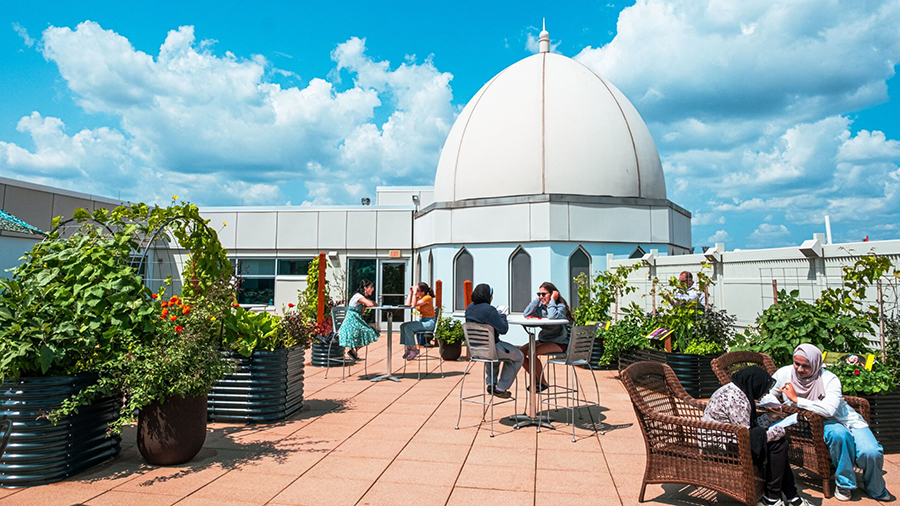
Visitors enjoying the rooftop garden. Photo by Jacob Ermete/Arab American National Museum.
We’re grateful for the resources and opportunities you’ve been sharing online in solidarity with Palestine – this is an issue that’s important to many of us, and a key question our community grapples with is how we leverage our work in arts and culture as a vehicle for change. Given that, would you be open to sharing what it’s been like these last few months at AANM with regard to what’s happening in Gaza? How does the museum think about its role in this important global moment? Are there any resources you’d like to share?
Thank you for asking that. It’s certainly been a hard time for everybody, I think. I don’t think you have to be Arab to witness how horrible this genocide is – humans are hurting and suffering. It’s certainly felt, and it’s been an important time for us to consider what we’re doing, how we can support, and how we connect with solidarity.
In that context, we’ve been trying to uplift Palestinian stories and poets and people as much as possible through our residency program and through our public programming offerings. We’ve been offering physical space in the museum to local organizations in the area who are doing direct action work to support people in Gaza, and supporting people here who are speaking out about what’s happening in Palestine and being punished for it, like in schools, universities, and workplaces where they’re being retaliated against.
It’s always important to speak out, but also to show our commitment through action. That’s why we’ve also been trying to support other organizations who aren’t sure what to do in this moment, providing any ideas that we can. There are so many resources online. Our communication team has been doing an amazing job of sharing reading lists and resources on our social media, and we would definitely encourage people to check that out.
Thank you for sharing. Before we wrap, is there anything else we haven’t talked about today that you’d like explore together?
It’s really important to us that people know that the garden is a space that’s open for people to come and learn and grow roots themselves. We hope that through the summer people are able to visit the garden, get their hands dirty, and come together as a community.
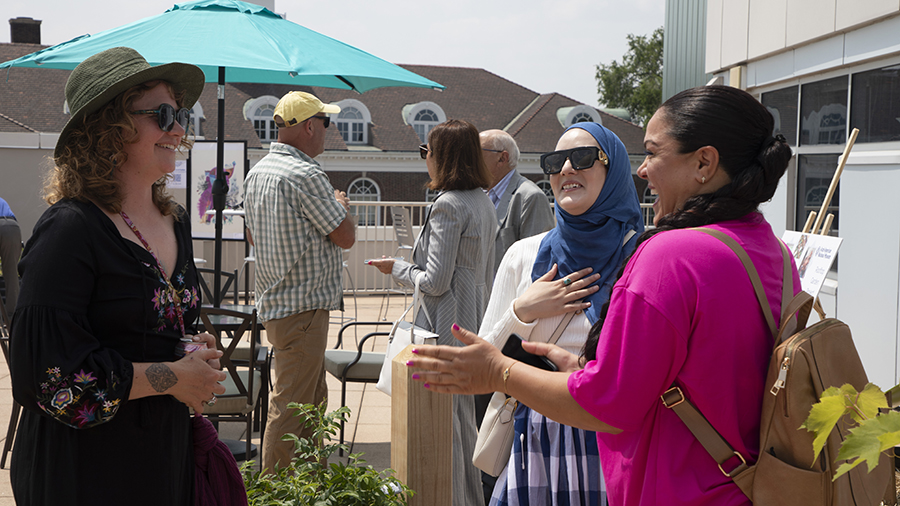
Guests at the opening celebration of the rooftop garden. Photo by Houssam Mchaimech/Arab American National Museum.
For more information about the Al-Hadiqa Heritage Garden please visit https://arabamericanmuseum.org/al-hadiqa-aanm-heritage-garden/
